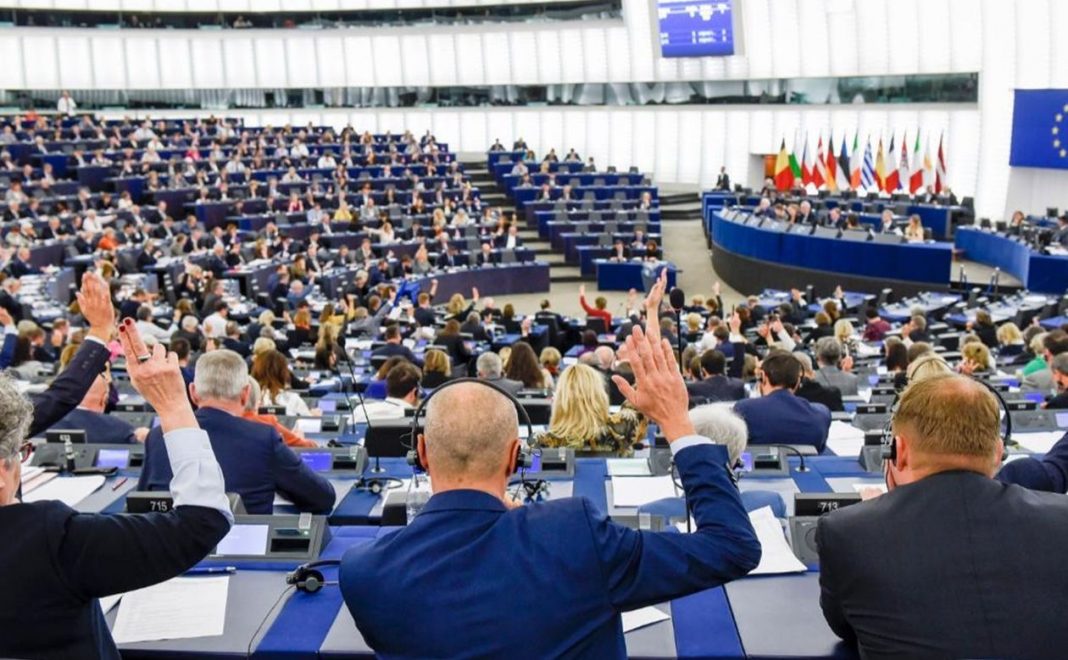Less than a month before the elections to the European Parliament, the results of sociological surveys show that the largest parliamentary groups (the European People’s Party and the Progressive Alliance of Socialists and Democrats) have every chance to retain their positions and, as a result of voting, to get approximately the same number of mandates that they have now. At the same time, the main changes are observed on the extreme flanks: if the ultra-left parties suffer total defeat, the right and ultra-right parties demonstrate consistent and steady growth of their ratings. In general, the new convocation of the European Parliament may look as follows:
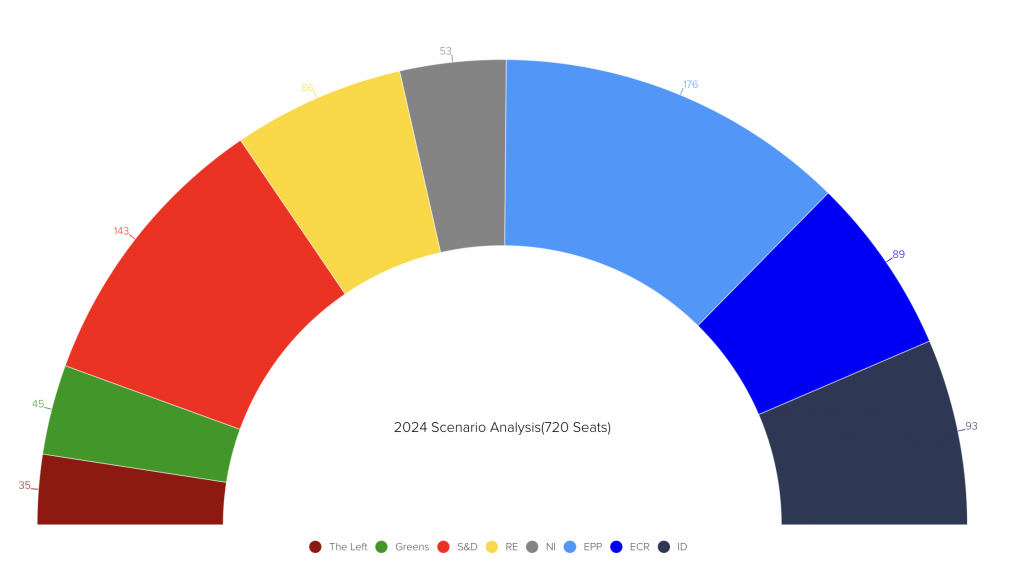
Source: Politico
Thus, EPP, with currently 179 seats, can receive 176, and S&D can increase the number of seats from 141 to 143. The largest growth is demonstrated by the group Identity and Democracy (ID), uniting right and some far-right parties, with 58 seats. Currently, in the next convocation, it can get 93 seats. The Greens are also showing noticeable growth trends: with 45 seats in the current convocation, their representation after the elections may increase to 71. The position of the far-right group ECR is also strengthening, which can increase its presence from 67 to 89 seats.
At the same time, sociologists predict a decline in the positions of the Renew Europe group, which focuses on Paris and Emmanuel Macron’s entourage. If there are 101 mandates in the current convocation, they can apply for 86 deputy seats after the elections. Also, a slight decline in positions is predicted in the ultra-left group The Left, which may lose three mandates: 38–35.
It is also important to note that the European Parliament currently consists of 705 members instead of 751 who were elected in 2019. After Brexit, 73 seats became vacant in the European Parliament. Forty-six of them were reserved for future newcomers to the European Union during its expansion. Also, 27 mandates were distributed among the current members: the representation of France and Spain increased by five people. The Netherlands and Italy received three additional mandates, Ireland 2, and one each from Poland, Romania, Sweden, Austria, Denmark, Slovakia, Finland, Croatia and Estonia. In this scenario, the difference between the results of 2019 and 2024 looks more noticeable:
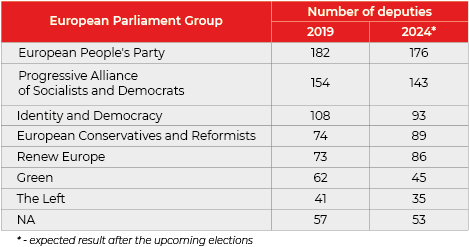
Even though London was the leading “supplier” of Eurosceptics for the European Union, the UK’s exit from the EU and the corresponding reformatting in the European Parliament did not lead to an increase in the influence of Eurosceptics, which many analysts previously predicted, although their number has increased slightly compared to the previous one convocation. The main Eurosceptic faction of the EP, which existed in the seventh conference (2014–2019), had 47 members, 24 of whom were representatives of the British Independence Party. However, after the 2019 elections, neither the new Brexit Party (founded by former members of the British Independence Party) nor the Democratic Unionist Party nor the Italian Five Star Movement could successfully negotiate forming a single group and remained non-factional. The lack of consensus among Eurosceptics allowed right-wing populists to create a fairly substantial group, “Identity and Democracy,” which included 73 deputies. However, having formed the fifth most prominent group in the European Parliament, representatives of the right-wing populist Identity and Democracy were left without a leadership seat. Despite violating several norms and principles, the European Parliament granted leadership positions to groups formed from a smaller number of deputies.
In this case, attention should be paid to a specific trend. If we divide the countries of the European Union according to the conditional indicator of belonging to the American or British orbits of foreign policy influence, then in many countries from the second group, there will be stronger far-right and Eurosceptic sentiments in domestic politics. First, we are talking about the countries of Scandinavia, the Baltics and Eastern Europe. According to this indicator, Great Britain’s interests partially coincide with Russia’s interests, which is trying to extend its influence on internal political processes in the European Union through parties and forces that support far-right ideology and Eurosceptic sentiments. However, one should not blame Great Britain for coordinating actions with Russia. London uses this coincidence of interests instead to cover up such intentions and actions rather to consolidate positions with Moscow.
That is why, on the eve of the elections to the European Parliament, the UK factor should be taken into account as one of the significant levers of influence on the internal policy of the European Union and the popularisation of Eurosceptic sentiments. The two main factors further influencing the intensification of the crisis between London and Brussels remain the issue of the Northern Ireland border and the dispute over the amount of compensation that the UK must pay to the European Union for its exit.
While most member states plan to hold elections on June 9, the Netherlands will start their elections on June 6. In some countries, the election date has yet to be determined but will take place within the stated four-day period:
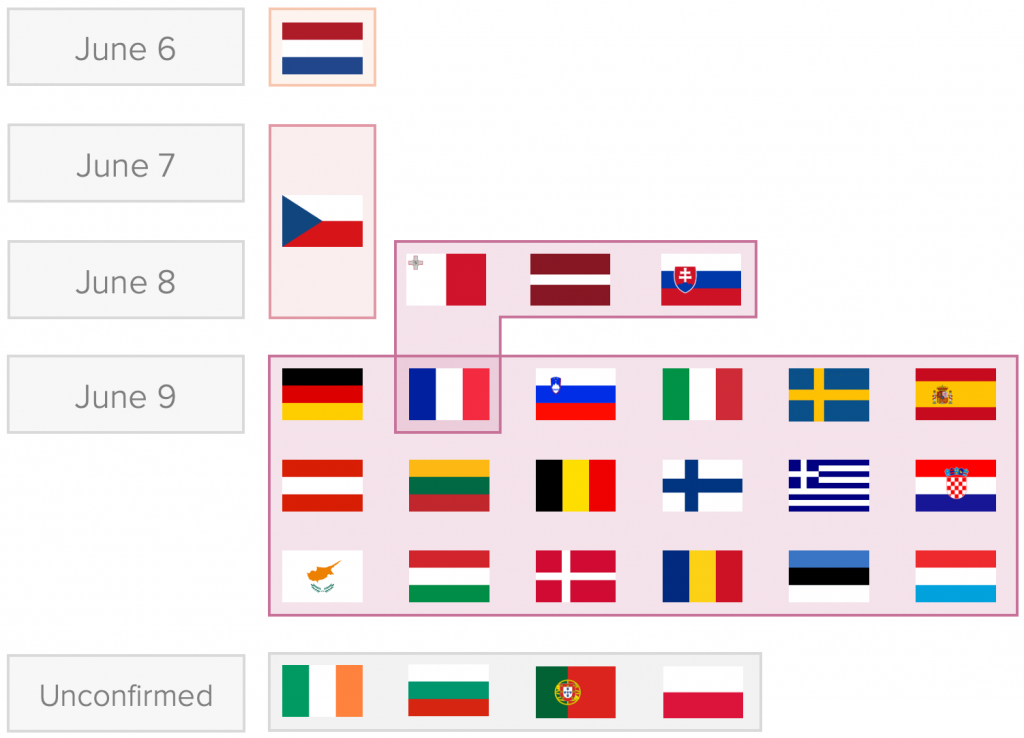
Source: Politico
Recently, the main conversations in the context of the upcoming European Parliament elections have been strengthening right-wing and far-right parties. However, it is essential to note that right-wing ideology began to gain momentum in Europe much earlier. For example, since 2010, Viktor Orban has been confidently strengthening his power in Hungary, and since 2015 in Poland, the right-wing “Law and Justice” has won all elections. Every year, the voices of right-wing parties become louder, and judging by the results of elections in many states, they have gone on an active political offensive throughout Europe. Right-wing populists and far-rights are winning national elections, forming coalitions and entering parliaments and governments. In this context, the primary trend is that representatives of parties with a similar ideology, to whom until recently the political establishment was openly in no hurry to pay attention, calling them losers and marginals, have firmly entered the political discourse and gained a foothold in the European mainstream. Moreover, in some cases, the extreme right has already become the government itself and is actively shaping the current political agenda.
At the same time, it is essential to pay attention to a specific trend observed in the actions of right-wingers and populists who come to power in certain countries of the European Union. One of the most striking examples in this case is the Prime Minister of Italy, Giorgio Meloni.
So, in September 2022, at the head of a centre-right coalition led by the Brothers of Italy party, Meloni became Italy’s first woman prime minister, and the country received its first right-wing coalition government since World War II. The result shown by the “brothers” – 26% – was even slightly higher than preliminary forecasts. Given that the Brothers of Italy’s roots go back to Benito Mussolini’s fascist party, it is not surprising that many were greeted with great alarm by the rise to power of a far-right party, especially on the centenary of the fascist seizure of power in Italy in October 1922.
However, after taking office, Meloni demonstrated her ability to adapt promptly and “change shoes” quickly. She carried out a conditional “rebranding” and today positions herself as the “usual conservative force leader.” Before coming to power, the Brothers of Italy was considered an anti-European party. They initially opposed the federal model of the European Union, advocating a return to a “confederation of sovereign states.” However, with the move to the Chigi Palace (the prime minister’s residence), George Meloni adjusted her agenda and now positions herself as a reliable partner of Brussels. She fit in well with the European establishment and became part of the company of heads of state and government at EU and NATO summits.
She made her first state visit to Brussels, where she met Ursula von der Leyen. In essence, Meloni showed that populism is an effective technology in elections, but when you come to power, you need money. Specifically, EU funds from the National Recovery and Resilience Fund. Italy’s recovery plan, which follows the unprecedented COVID-19 crisis, consists of 132 investments and 58 reforms and is supported by grants totalling €68.9 billion and €122.6 billion in loans. And as it turned out, money influences any political views.
A similar situation is observed in the Netherlands, where in November 2023, the Freedom Party (RVV), led by the far-right populist Geert Wilders, won early parliamentary elections. Wilders is a Eurosceptic who advocated leaving the European Union and an ardent anti-Islamist whose views for many years repelled all the country’s leading political forces from cooperating with him. He was made a target of extremists. The EU called Wilders’ victory a “political earthquake” and “Brussels’ worst nightmare.”
Anti-Islamism is Wilders’ calling card. Calls for a ban on mosques, the Koran and Islamic headscarves in government buildings, and “zero migration” were at the centre of his political manifesto. In response, the politician received threats against him, which is why the police had to put him under round-the-clock protection. As for his Euroscepticism, the politician has long proposed that the Netherlands restore border controls on the country’s currently open borders within the EU, declared his intention to hold a referendum on leaving the European Union (Next, similar to the British Brexit), and openly opposed “hysterical Russophobia.” in Europe. True, after the start of Russia’s aggression against Ukraine, Geert Wilders distanced himself from the Kremlin, calling Russian actions in Ukraine a mistake. But he has not become a fan of Kyiv either: during recent election debates, the head of the Freedom Party said that he would not support sending more weapons to the Ukrainians.
However, after winning the elections, Wilders faced the need to form a government, which cannot be done without a coalition. In the political conditions of the Netherlands, this process is very complex and lengthy (for example, current Prime Minister Mark Rutte took 271 days). This factor also had a noticeable influence on the position of Wilders, who has recently revised his views on migration policy, Islam, relations with the European Union, and assistance to Ukraine.
In this context, it can be argued that despite the growing trends of populist and far-right movements, the European Union still has sufficient tools to help suppress the anti-European ambitions and plans of individual political forces.
Polls in all 27 EU member states show that right-wing, populist and Eurosceptic parties will likely win first place in the polls in Austria, Belgium, the Czech Republic, France, Hungary, Italy, the Netherlands, Poland and Slovakia. They may be second or third in Bulgaria, Estonia, Finland, Germany, Latvia, Portugal, Romania, Spain and Sweden. Because Paris, Berlin, Rome and Madrid have the most significant national quotas in the European Parliament, creating a far-right majority is not such a fantasy. This gives rise to panic that a turn to the right could complicate the legislative activities of the European Parliament, as well as change the EU’s internal and foreign policy course. This may impact the green agenda most, which is not particularly interested in right-wing forces. The ability of the European Commission and the Council of the EU to make foreign policy decisions, including on support for Ukraine, may also be at risk. However, it is essential to consider that fears around the possible victory of the far right are also part of the election campaign and a means of mobilising their electorate for Euroscepticism opponents.
As of May 2024, the positions of political forces whose official ideology or public statements and actions can be regarded as far-right in the countries of the European Union are as follows:
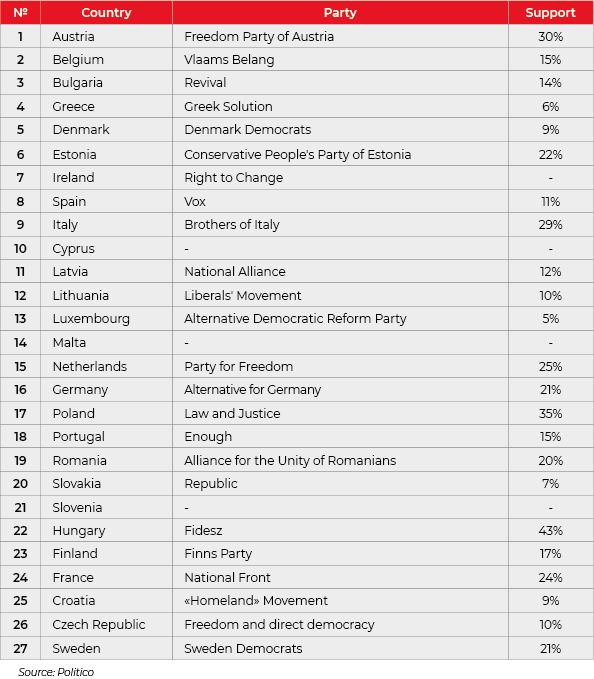
In addition to the instability of ideological positions, right-wing and far-right politicians often demonstrate an inability to find a common language with their colleagues from other countries. Thus, on December 3, 2023, a meeting of leaders of European far-right parties took place in Florence, Italy, during which some plans for joint activities were announced on the eve of the elections. In general, far-right politicians have expressed a desire to reform the European Union and prevent it from becoming a “five-star hotel for refugees from Africa.” The meeting participants also stated that based on the results of the European Parliament elections, they plan to form the third largest group, which will allow them to seriously influence the formation of the policy of the entire Union. However, it should be noted that at this meeting, it was impossible to gather all representatives of the far-right forces of the European Union: representatives of Italy, the Netherlands, France and several other countries were present; other politicians either ignored the meeting or joined it online. Such an approach may also indicate a lack of consensus among parties with similar ideologies. This could become a severe problem when forming a unified force in the new European Parliament.
A similar situation was observed in the two previous convocations of the European Parliament. After receiving parliamentary mandates, many right-wing politicians either could not find a common language with colleagues from other parties and formed separate groups or remained independent deputies, reducing the opportunities for deputy groups to obtain leadership positions. This problem may arise during the formation of the new European Parliament.
One of the most active factors contributing to the growth of far-right sentiments in Europe remains the migration issue, which cannot be controlled and regulated properly. The active growth of the migration wave in the European Union countries began at the end of 2010 when most MENA countries plunged into a protracted political crisis accompanied by coups d’etat, civil wars and mass protests. The processes, better known as the Arab Spring, spread to varying degrees across 18 states in the region and provoked the outbreak of four significant wars – in Yemen, Syria, Libya and Iraq. Already in 2015, the flow of migrants (primarily illegal) to the countries of the European Union exceeded all previous figures and began to pose a real threat. The majority of the asylum seekers in Europe were citizens of Syria, Afghanistan, Iraq and several African countries. Corresponding corridors were also formed through which illegal migrants most often entered the territory of the European Union.
At the same time, such a phenomenon was first recognised as a crisis, to which a general action plan was proposed, the main goal of which was to determine quotas for each EU country to accept a certain number of refugees. According to official data from Eurostat alone, between 2015 and 2017, the European Union accepted about 2.8 million refugees, the bulk of which (about 1.4 million) came from Germany. In many cases, mass migration due to illegal routes has resulted in loss of life. In particular, a shipwreck near the Italian island of Lampedusa, which occurred in April 2015, immediately led to the death of 800 migrants. Also, in August 2015, a truck containing more than 70 bodies of migrants was found near Vienna (Austria).
Even though several analysts and economists have tried to appeal to the positive factors of migration, which may include the attraction of new and cheaper labour, as well as the general rejuvenation of the European population (this problem does pose a serious threat to Europe, since its population is gradually ageing and rejuvenates much more slowly than, for example, the African population), the migration crisis nevertheless became one of the essential factors that significantly aggravated the economic and political crisis within the Community. Thus, already in 2016, the fight against migration became one of the main slogans of “Brexit” – the process of Great Britain’s exit from the European Union. Although the issue of migration was only one of many factors influencing the UK’s decision to leave the EU, after the implementation of this process in 2020, the flow of illegal migrants into the country increased by 18% (at the same time, the number of people moving to Britain officially decreased by 88%).
In October 2023, Eurobarometer published another study, according to which the problem of migration is one of the most important demographic issues worrying residents of the European Union. At the same time, the issue of combating illegal migration occupies a compelling place in most election programs of right-wing and far-right parties, which demonstrate a significant expansion of their electorate and even come to power in some EU countries.
At the same time, over the past eight years, active discussions have occurred in the European Union about the need for a fundamental reform of the standard migration policy. Thus, on October 4, 2023, the member states reached an agreement on the controversial regulation on crisis and force majeure, which made it possible to begin negotiations with the European Parliament on a package of reforms in migration and asylum. However, it is already noted that this regulation will not improve the approach to crises with migrants at the EU borders. Although the EU Council did manage to reach an agreement on the proposal for a Crisis Regulation, there is still no complete consensus among EU member states. For example, Germany delayed its support for the text, demanding additional safety and protection measures for children and families. Several Eastern European countries demanded more significant restrictions, while the priority for the Baltic countries, Greece and Cyprus was to include provisions on the so-called “instrumentalisation” of migrants. Poland and Hungary voted against adopting the standard approach, while Austria, the Czech Republic and Slovakia abstained from voting.
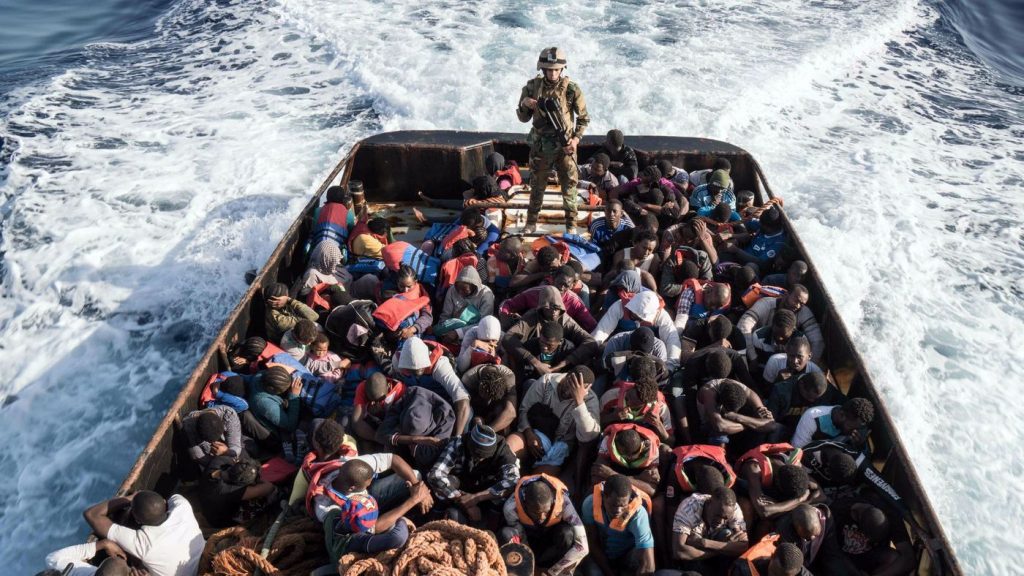
Another important factor that has a direct impact on the political mood in the European Union remains the partial breakdown of economic and political relations between Brussels and Moscow. As of the beginning of 2024, an analysis of a number of economic and political factors that arose against the backdrop of the EU’s tough sanctions policy towards Russia allows us to state that such an approach had a negative impact not only on the Russian economy but also on the economic and political situation in Russia itself. European Union. Already, these factors play an important role in shaping electoral sentiments, which are especially intensified on the eve of the elections to the European Parliament. First of all, among such factors, the following can be distinguished:
- At the everyday level, Europe is increasingly tired of the war and tries to ignore it. Thus, according to the results of sociological studies conducted in 2023, on the eve of the first anniversary of Russia’s full-scale invasion of Ukraine, Europeans showed mixed feelings regarding the need for further military support for Ukraine. Residents of Sweden demonstrated the highest level of further military support for Ukraine – 63%. Only 18% of Swedes supported the option of peace negotiations. In Denmark, the need for full support for Ukraine was chosen by 56% of respondents, and in the UK – 53%.
However, residents of Spain, Germany and France showed a virtually even distribution into two camps, where half of those surveyed support military action, and the other half advocate the need for a negotiation process. Residents of Italy, according to the survey results, showed a significant advantage in supporting peace negotiations, even if Ukraine had to cede territory (47% versus 29%). And although the majority of Europeans openly say that they want Ukraine to win the war, their numbers differ markedly in different countries. The largest number of supporters of Ukraine’s victory is indicated in Denmark (88%) and Sweden (84%). But the sentiment is somewhat different in France and Italy – 58% and 56%, respectively. In turn, 13% of Germans and 11% of French and Italians support a complete victory for Russia.
Already in June 2023, the European Parliament published the results of a new survey, which demonstrates that Europeans’ fatigue with Ukraine continues to grow. Of course, despite maintaining a dominant position regarding the need for further support for Ukraine, individual European countries are demonstrating rather threatening trends. For example, in Italy, 34% of respondents express confidence in the Ukrainian authorities, while 46% express distrust. Also, 28% of respondents accuse Ukraine of provoking war. In Poland, 35% of respondents stated the need to reduce the volume of assistance to Ukraine. The study also shows that support for anti-Russian sanctions dropped from 71% to 58% over the year, demonstrating a further downward trend.
- The consequences of economic sanctions against Russia directly impact the European industrial sector and average citizens. Despite 13 sanctions packages imposed against Russia since the full-scale invasion, the main items of the Russian budget, which include the export of oil, gas, rare earth metals and agricultural products, continue to flow into foreign markets and bring in excess profits. Thus, in 2022, the Russian budget received $230 billion from oil exports and $83 billion. – on the export of petroleum products. At the end of 2023, the reduction in revenues from oil and gas exports showed about 20%, but not so much because of sanctions, but because of the fall in world prices. However, in October 2023, Russia’s net oil revenues reached $11.3 billion, or 31% of the total Russian budget revenue for the month, which was the highest figure since May 2022 and exceeded any month before Russia invaded Ukraine. Similar trends continue in 2024.
However, the main factor that directly impacts electoral sentiment in the European Union remains the stability of the European economy, which in many cases demonstrates crisis trends. Already, several factors can be observed that force European governments to violate sanctions obligations and give preference to national interests. Thus, in the nine months of 2023, Spain imported six times more Russian gas than in 2018 and the same amount as in 2022. This is direct evidence that dependence on Russian energy resources in Europe still plays an essential role in shaping the domestic political agenda. In this case, it should be noted that such an example is not isolated.
It is also essential to pay attention to the fact that on the eve of the elections to the European Parliament, a severe problem for Brussels is not only the strengthening of the far right and populists but also a noticeable crisis within the European People’s Party (EPP). The party is currently experiencing a leadership crisis: most EU member states are led by either right-wingers, socialists or populists. At the same time, among the conservative leaders who identify themselves with the European People’s Party, there remains the President of the European Commission, Ursula von der Leyen and the Prime Minister of Poland, Donald Tusk (former leader of the EPP). It is this tandem that is currently making maximum efforts both to preserve the position of United Russia and to expand the influence of the conservative idea. According to available information, the ERR must retain Ursula von der Leyen as President of the European Commission after the upcoming elections. Sources report that currently this option looks pretty realistic since ERW representatives managed to obtain the support of several European states. The main negotiator in this process is Donald Tusk. Another influential representative of the ERR is Croatian Prime Minister Andrej Plenkovic, who, after the elections, may become a member of the European Commission, receiving the post of EU High Representative for Foreign Affairs and Security Policy.
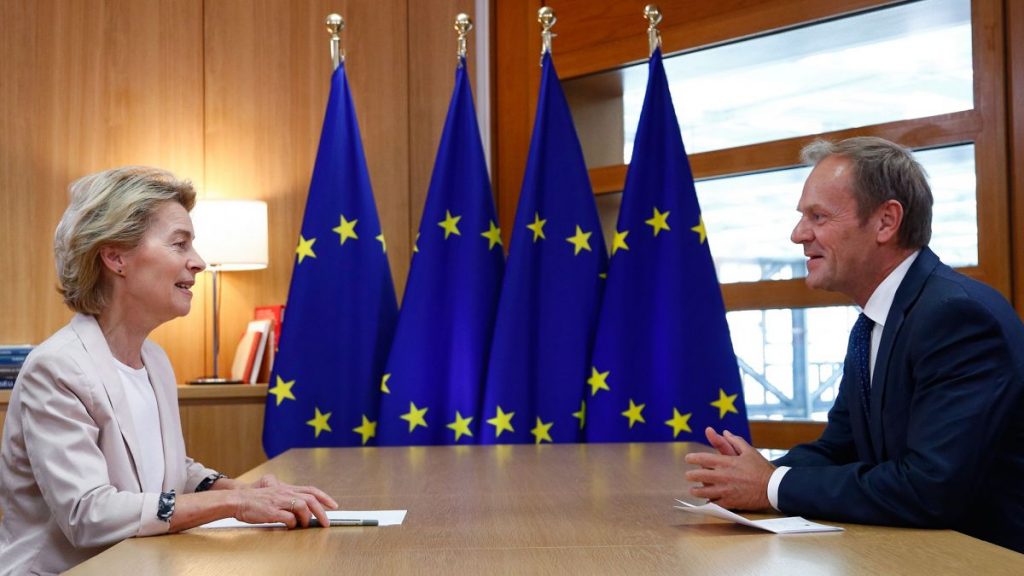
An equally important aspect influencing electoral sentiment in the run-up to the elections to the European Parliament remains the issue of reform of the EU’s Common Agricultural Policy (CAP), the main stage of which was launched in 2023 and led to massive protests by farmers across Europe. Throughout the entire period of the existence of the European Union, the BSC remained one of the most important and most expensive areas of EU activity (more than 40% of the total budget). In the conditions of the post-war crisis, which was observed in the first decades after the Second World War, the unification processes in Europe were forced to start from the need to ensure food stability and independence. Therefore, considerable attention has always been paid to this issue, and the factor of agricultural policy itself has been regularly used as an essential tool for influencing European political, social and economic processes.
The new MSP 2023-27 is the main instrument for securing the future of agriculture and forestry and achieving the goals of the European Green Deal. The common agricultural policy reform was officially adopted in December 2021; new legal means – starting in January 2023 – aim to ensure a fair, greener and more profitable BSC.
However, the reform itself received an extremely negative reaction among European farmers since many of them were left without subsidies or received significantly less than they originally planned. This led to mass protests and rallies. The European agricultural sector is distinguished by its locality and relatively small industries that require financial assistance from the state.
In this context, it is important to note that Ukraine immediately became a double factor that negatively affected the electoral mood of European voters, especially farmers: firstly, the increase in exports of Ukrainian agricultural products, taking into account the removal of quotas and the introduction of actual free trade, constituted real competition for European producers. Secondly, even more alarming for European farmers is the prospect of Ukraine joining the EU. If this plan is implemented, more than 30% of subsidies will be redirected to Ukrainian farmers. These factors became decisive in forming anti-Ukrainian sentiment among European farmers, often supporters of right-wing parties. A clear example of such a situation was the local elections in Poland, in which Andrzej Duda’s Law and Justice party managed to win due to more aggressive rhetoric towards the Ukrainian agricultural sector.
It is crucial to underline that from 1 July 2024, the Council of the European Union will be chaired by Hungarian Prime Minister Viktor Orbán. The fact that a country with significant rule of law deficiencies will hold the Presidency of one of the EU’s most critical institutions for six months is a matter of serious concern. In a resolution adopted in June 2023, the European Parliament questioned Hungary’s ability to “carry out this task convincingly” and called on the European Council to “find an appropriate solution” – likely by stripping Hungary of its Presidency. This potential scenario raises red flags and necessitates a careful assessment of the situation. (The European Council is a body consisting of the 27 leaders of the EU; the Council of the European Union consists of the national ministers of all member countries; only the latter discusses legislation, mainly with the European Parliament, and adopts it).
During its Presidency of the Council, the Hungarian government has three main tasks:
- Firstly, to chair the meetings of the Council, organise its work and determine the agenda. This gives him particular influence over which topics are given more time, space and resources on the board and which are not. The General Affairs Council is also responsible for preparing and overseeing the content of meetings of the European Council, which is attended by the 27 heads of state and government. This allows the Hungarian government to exert, albeit indirect and limited, but still influence on the highest decision-making body of the EU.
- Secondly, the Chairman of the Council is faced with the task of acting as a mediator between member countries and finding compromises in negotiations. This also means that he must act neutrally and impartially in his role as an honest broker between different European interests.
- Thirdly, the Presidency of the Council represents the Council of the European Union in its relations with the European Parliament and the European Commission. As part of the legislative process, the Presidency negotiates with other EU institutions on behalf of the Council. This is an essential prerogative because the so-called trilogue negotiations do not involve other member countries, so the Presidency has considerable discretion in how the negotiations are conducted.
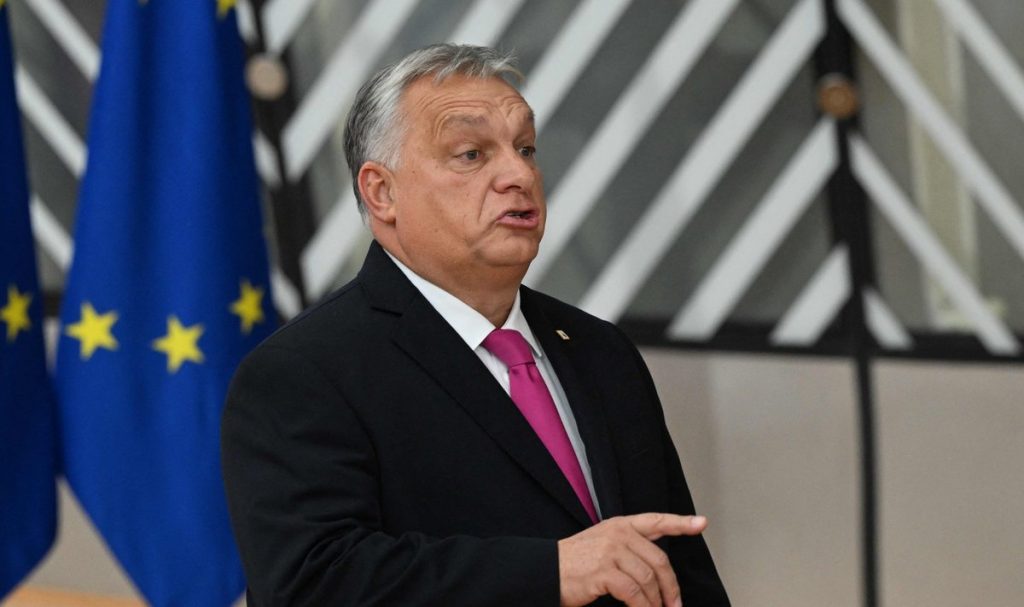
The first two roles are of particular concern for Hungary. There are fears that Orbán’s government—even more so than other Council presidents—will prioritise only those issues that are in its interests while others fall by the wayside. Given his other attempts to split the EU, this poses a problem.
However, it is important not to exaggerate the institutional role that Hungary will play during its Presidency of the Rada. The timing of the Hungarian Presidency must be assessed against the backdrop of both the institutional context and the period in which it occurs.
New personnel outline
The following persons are amongst the expected candidates for the post of Country Commissioner:
- Germany: Von der Leyen will likely remain EC President. In the unlikely event that she does not win the position of Commission President, the Greens will propose a German Commissioner in line with the government’s traffic light coalition agreement.
- France: Thierry Breton will likely remain in the EC as a French counterweight to von der Leyen. Among the current cohort of commissioners, Breton appears to have the best chance of continuing the job and even promoted his post (for example, to vice president), given both his domestic popularity and his growing profile in Brussels.
- Italy: The largest ruling party, the Brothers of Italy, apparently intends to nominate Agriculture Minister Lollobrigida for the commissioner post, but he would prefer to remain in Rome. EU Minister Fitto would be interested in the post, but government leader Georgia Maloney doesn’t want to let him go. Previous media reports had named Venice regional president Zaya as the favourite for the Commissioner position, but he said he wanted to keep his current job. Foreign Minister and former Commissioner Tajani would probably be interested, but as the leader of the minor coalition party, he cannot qualify for the post.
- Spain: Environment Minister Ribera is one of the favourites to succeed Josep Borrell, who will step down.
- Croatia: Prime Minister Andrej Plenkovic is also being considered to replace Josep Borrell for the EU High Representative for Foreign Affairs and Security Policy post.
- The Netherlands: Current Commissioner Wopke Hoekstra’s second term in office is possible if his party remains in government or is supported by parties of a similar orientation.
- Austria: EU Minister Edtstadler and Foreign Minister Schallenberg are favourites to succeed Johannes Hahn, who will step down.
- Marion Draghi, a former European Central Bank President, or the European Council President Charles Michel are often mentioned as possible successors of Usrula von der Leyen in case if she cannot be reappointed.
- The Socialists will also have a powerful vice president, who will most likely come from a smaller country. Von der Leyen’s flirtation with the far right puts her in a delicate position as she also depends on the support of the AfD, which has made clear its refusal to cooperate with the far right.

